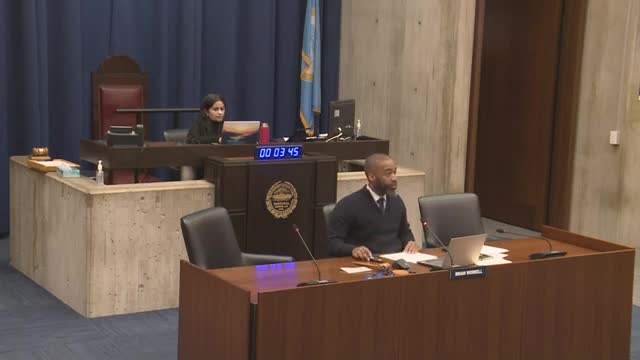Reentry groups, tenants and veterans urge City Council to boost rent-subsidy funding and support reentry housing
Get AI-powered insights, summaries, and transcripts
Subscribe
Summary
At a Feb. 18 Boston City Council Ways and Means hearing on the FY26 budget, multiple residents and nonprofit representatives urged the council to increase city rent subsidies, expand project-based vouchers and fund reentry housing programs led by Justice for Housing and allied groups.
Boston City Council Committee on Ways and Means Chair Brian Worrell opened a Feb. 18 public testimony session on the city’s fiscal year 2026 budget and the Boston Public Schools budget, and dozens of residents used the forum to press the council for more housing support for veterans, formerly incarcerated people and low-income tenants.
Why it matters: Speakers said increased city rent-subsidy funding and project-based vouchers can keep long-term residents and vulnerable households housed, reduce recidivism and avert higher downstream costs to shelters and social services.
Multiple witnesses described housing programs operated by Justice for Housing and allied groups that pair reentry-specific residences with legal advocacy and wraparound services. Dr. Naya Wilson, Hands on Defense program manager at Justice for Housing, said, “To date, we've housed over 300 men and women using our hands on defense model.” Wendy Dinkins, reentry director at Justice for Housing, told the council, “This budget is important to keeping our community safe.”
Justice for Housing representatives described a portfolio of services including reentry houses (men’s and women’s), rapid rehousing for youth ages 18–25, legal advocacy to challenge housing denials tied to criminal records and landlord mediation. Formerly incarcerated residents who testified credited those services with securing housing and employment after release.
Advocates asked the council to increase the city rent subsidy program. Michael Kane of the Mass Alliance of HUD Tenants said the city’s $1 million increase last year produced meaningful placements and that more funding would reach hundreds more people; he told the committee the prior increase “is enough for about another 400 people.” Coalition speakers requested a $5 million city allocation to expand vouchers and project-based subsidy agreements that anchor affordability in specific buildings.
Tenants and tenant organizers also highlighted buildings facing affordability loss. Tenants at the Forbes Building in Jamaica Plain and advocates with the City Rent Subsidy Coalition testified about the difficulty of securing project-based subsidies from private owners and urged stronger city outreach to owners and developers to lock in long-term affordability.
Councilors and staff did not take final action at the hearing; the administration will submit a proposed budget on April 9 and the council plans a vote on the mayor’s budget on June 4. Speakers asked councilors to file and defend amendments to direct more operating money to rent subsidies and reentry programs.
Context and next steps: No formal vote occurred at the hearing. Advocates said increased city-funded vouchers and project-based subsidies are contingent on council amendments and final budget negotiations with the mayor.
